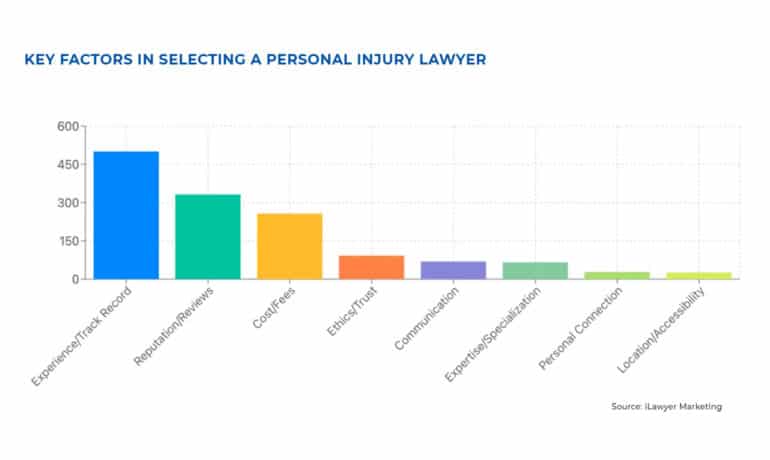Potential clients have countless resources at their fingertips when evaluating and hiring a personal injury lawyer. From case results to review platforms, understanding which factors matter most to prospective clients can help your law firm market more effectively and stand out from the competition.

Table of contents
A recent survey by iLawyer Marketing sought to identify key decision-making factors for consumers when hiring a personal injury lawyer. The study involved 1,274 participants who were asked an open-ended question about these factors, ensuring that responses were not influenced by pre-selected options.

Experience and Winning Track Record: The Leading Factor in Hiring a Personal Injury Lawyer
Nearly 40% of respondents cited experience and a strong track record as their top priority when choosing a law firm. In this context, experience refers to both how many years the firm has been practicing law and whether it has experience handling similar cases to the potential client’s.
Additionally, 27% of participants mentioned the importance of seeing evidence of success, with terms such as “success rate,” “winning” and “track record” appearing frequently in responses. Potential clients want reassurance that the attorney they choose has a proven ability to achieve favorable outcomes.
Given this, it is essential for law firms to prominently share case results on their websites. A dedicated case results page in the main menu navigation, along with a display of the firm’s success rate on the homepage, can significantly enhance visibility and client confidence.
Reputation and Client Review
While many assume that a firm’s reputation is the most important factor, the survey found that it ranks second. A previous study by iLawyer Marketing revealed that 89% of consumers would not consider hiring a law firm with fewer than four-star ratings, reinforcing the importance of reputation in client decision-making.
Online reviews shape consumer trust and influence hiring decisions. While Google, Yelp and other platforms provide essential social proof, clients also weigh referrals from family and friends. Interestingly, negative reviews are not always a dealbreaker; rather, how a law firm responds to negative feedback plays a crucial role in shaping perceptions. A well-handled response to a dissatisfied client can demonstrate professionalism, accountability and a commitment to client satisfaction.
Law firms can enhance their credibility by actively managing and responding to reviews, showcasing positive client testimonials on their websites, and encouraging satisfied clients to leave reviews.
Consumer Concerns Over Pricing
Many people hesitate to hire an attorney because they are unclear about the costs involved. Nearly 20% of survey participants cited pricing as a major factor in their decision-making process, highlighting the need for better transparency around fees.
Despite the widespread use of contingency fee structures in personal injury law, many clients still misunderstand how these arrangements work. Some assume they must pay upfront, while others fear hidden fees. Law firms can alleviate these concerns by clearly explaining their pricing structure in simple terms, offering an FAQ section on their website, and providing transparency about what percentage of a settlement will go toward legal fees.
Educational content, such as blog posts and videos, can also help demystify legal costs, making potential clients feel more comfortable and confident about seeking representation.
Honesty, Ethics and Trust
Hiring a personal injury lawyer often involves high-stakes situations that can affect a client’s financial, physical and emotional well-being, making trust and honesty critical factors in the selection process. Although only 8% of survey respondents explicitly mentioned these qualities, they are often implicit in other decision-making considerations.
Many respondents reported negative past experiences with attorneys or fear of being misled about their case’s potential. To build trust, law firms must ensure their marketing materials are transparent and free from exaggerated claims. Statements such as “we win every case” can damage credibility and create ethics problems. Instead, emphasize commitment to ethical representation and client advocacy.
Displaying affiliations with professional organizations such as the American Bar Association or state bar associations reinforces integrity and trustworthiness. Additionally, incorporating client-centered communication — such as offering clear legal explanations, being upfront about possible case outcomes, and maintaining open lines of communication — helps establish credibility.
Communication and Accessibility
Clients expect attorneys to be responsive, clear and proactive in their communication. While communication was not the most frequently mentioned factor in the survey, it remains a key differentiator.
Law firms that provide regular case updates, use plain language instead of legal jargon, and are readily available to answer client inquiries can set themselves apart. Implementing tools such as secure client portals for real-time case updates, automated appointment scheduling and 24/7 chat support can significantly enhance the client experience.
A lack of communication is one of the most common complaints in negative attorney reviews. Attorneys should aim to establish personal rapport with clients, ensuring they feel heard and valued throughout the legal process.
Location Is a Declining Concern
Surprisingly, location was the least mentioned factor in the survey, appearing in only 26 responses. This finding aligns with the growing acceptance of remote consultations and virtual legal services.
While in-person meetings may still be necessary for certain types of cases, many legal services can now be conducted remotely. Firms that offer virtual consultations, online case evaluations and digital document signing can expand their client base beyond their immediate geographical area, catering to the needs of modern consumers.
Key Takeaways for Personal Injury Law Firms
This survey confirms that clients consider multiple factors (76%) when choosing an attorney, making it crucial for law firms to take a comprehensive approach to their marketing and client engagement strategies. Firms need to ensure they effectively communicate experience, highlight positive reviews, clarify pricing structures, and build trust through transparency.
As consumer expectations continue to evolve in 2025 and beyond, law firms must embrace digital transformation, transparency and ethical branding to remain competitive. With artificial intelligence and automation playing a growing role in legal services, firms should explore new ways to enhance efficiency while maintaining a personal touch.
Image © iStockPhoto.com.

Sign up for Attorney at Work’s daily practice tips newsletter here and subscribe to our podcast, Attorney at Work Today.
















